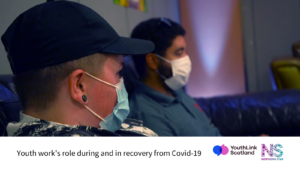Youth work in Scotland played a vital role in supporting children and young people’s health and well-being during the most difficult phases of the Covid-19 pandemic, read our research for more.

Youth work in Scotland played a vital role in supporting children and young people’s health and well-being during the most difficult phases of the Covid-19 pandemic. Youth workers rose to the challenge of providing remote services and supporting some of the most vulnerable people in the country. To explore the role of youth work in responding to and recovering from Covid-19, YouthLink Scotland with support from Northern Star was funded to complete an evidence review as part of the Scottish Government Covid-19 Learning and Evaluation Oversight Group.
During the coronavirus pandemic, young people were unable to attend school, college or work and were unable to meet and socialise with their peers. Youth workers quickly established digital services to provide opportunities for connection and engagement, which helped to alleviate feelings of isolation, loneliness, and anxiety among young people. Youth work provided safe spaces for young people to have fun, access support, and advice, and connect with others when there were very few other services available.
The Get into Summer programmme was an investment of £20 million in Scottish Government funding that supported children and young people to socialise, play and reconnect during the summer holidays of 2021. The programme increased physical activity, helped children and young people spend more time outdoors, and improved well-being and food provision, particularly for low-income families. However, there were some barriers to participation for low-income families, children with disabilities or additional support needs, and minority ethnic families.
Youth workers reported that one of the main impacts of youth work on young people was providing opportunities for connection and supporting their mental health. Giving young people chances to plan and look to the future helped to build optimism.
The review also identified some challenges and areas for improvement, including the need to address barriers to participation for certain groups of young people and the need for ongoing professional development to support youth workers in delivering digital youth work.
However, the youth work sector experienced significant challenges during the pandemic. Access to buildings and facilities was a significant problem, which created barriers for youth work in providing a safe space to support young people. A lack of access to facilities led many youth work organisations to provide youth work outdoors, although this became very challenging during the winter months. The youth work sector still faces barriers to accessing facilities and ongoing issues with sustainable funding.
Commenting on the findings of the report, Jamie Hepburn, Minister for Higher Education and Further Education, Youth Employment and Training said:
“The research findings tell us that during the pandemic, the youth work sector adapted and responded quickly to the needs of young people. For example, it is clear that the pivot to digital youth work and the utilisation of digital technology is, and will continue to be, an important aspect of youth work delivery going forward. The Scottish Government is taking forward work to produce a new youth work strategy for publication in Spring 2023, and this will aim to improve outcomes for young people through a stronger, better connected system that offers opportunities to promote equality, equity and that is inclusive of the needs of all young people.”
Tim Frew, CEO of YouthLink Scotland said:
“The Covid-19 pandemic was a challenging time for young people in Scotland, but youth work provided a much-needed source of support and hope.
“As we move beyond the pandemic, it’s vital we continue to recognise the crucial role of youth work in supporting our young people, and build on the successes of the youth work sector, ensuring all young people have access to the services they need, when they need them.
“It’s also clear from the report that we need to do much more to break down barriers to participation for marginalised and vulnerable young people, who were disproportionately affected during Covid-19.”
Watch our videos on our Covid-19 research: